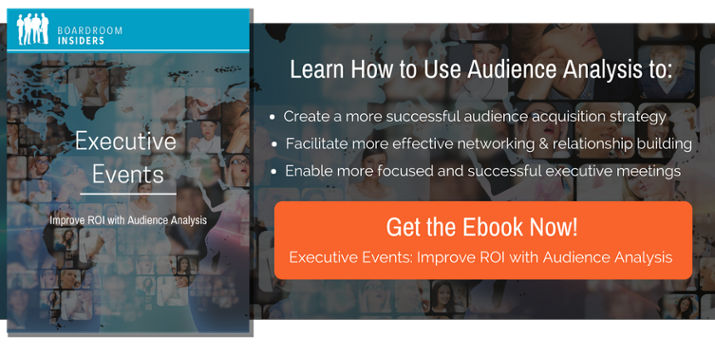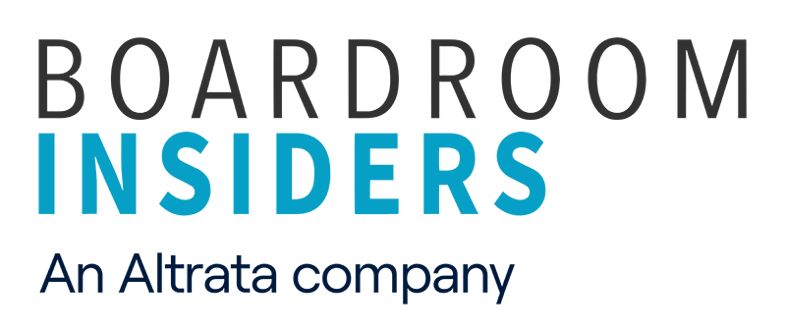
If you’re a technology marketer, you’re likely looking at the calendar, anticipating a fall season packed with industry events and executive summits. In addition, your sales leadership probably expects you to create compelling sponsorships and touchpoints at these events that will help them get face time with key customer decision makers.
The problem?
Between attending educational sessions, walking the exhibits and meeting with industry peers, your customers’ schedules are going to be jam-packed—and you will be vying for their time and attention with dozens of other vendors, some of which are your competitors.
The good news is, you have a secret weapon that can help you secure those meetings and broker game-changing conversations with your most important customers and prospects.
This weapon, if deployed smartly, can help you secure customer meetings and RSVPs, and make you a hero in the eyes of your sales team.
This secret weapon?
Your own executive team.
It’s true. Think about it. If you were a busy CXO or SVP, what would you say yes to? A meeting with a salesperson? Or a meeting with an executive-level peer—someone equipped to have an informed business conversation and who has the authority to green light a new and innovative approach to solving your business problems?
.png?width=250&name=The%20single%20most%20critical%20success%20factor%20in%20securing%20executive%20meetings%20at%20industry%20events%20is%20the%20presence%20and%20engagement%20of%20your%20own%20executive%20team.%20(3).png) Empirical evidence points to the latter. After 15 years of working with marketers, I can tell you with the utmost confidence that the single most critical success factor in securing executive meetings at industry events is the presence and engagement of your own executive team. If you can get their buy in and commitment to attend your event and spend time with your most important customers and prospects, your meeting calendar will be full. If not, that fancy meeting suite you rented will probably go unused—or more likely, become an expensive hangout space for your events team.
Empirical evidence points to the latter. After 15 years of working with marketers, I can tell you with the utmost confidence that the single most critical success factor in securing executive meetings at industry events is the presence and engagement of your own executive team. If you can get their buy in and commitment to attend your event and spend time with your most important customers and prospects, your meeting calendar will be full. If not, that fancy meeting suite you rented will probably go unused—or more likely, become an expensive hangout space for your events team.
While it seems like a no-brainer, failing to engage your own executive team is a common pitfall. Fear and intimidation come into play: “Who am I to demand that my CIO spend two days at this event? She’ll probably say no!” Yes, she probably will—unless you give her a great reason as to why she should care (hint: tell her who else is going to be at the event, both customer-wise and peer-wise.) It’s up to YOU to sell your executive team on why meeting with customers at a particular event would be a good use of their precious time. And it is also up to YOU to brief them on everything that is going to happen—and who they are going to meet with and why—to ensure their meetings are successful.
 With this in mind, here are four things you and your team can do to secure the engagement and commitment of your own executive team:
With this in mind, here are four things you and your team can do to secure the engagement and commitment of your own executive team:
1. Focus on your most important accounts
Find out which companies are going to be attending and map these against your company’s list of strategic accounts. If you are a sponsor of an event, the event producer will typically provide ongoing information about which companies are registered throughout the registration cycle. Showing your executives that you are focusing on the most important accounts shows that you have done your homework--and will reassure them that the event will be a good use of their time.
2. Create the right touch points to facilitate easy networking and conversations.
Are you planning VIP dinners? Hosting a hospitality suite? Setting up meetings in a Mobile Executive Briefing Center? Planning a Thought Leadership Lunch? Create inviting social settings for your guests and your own executives. Knowing there’s a comfortable environment for conversation encourages participation from both your customers and your own executives.
3. Brief your executives ahead of time on key customers:
Feed your executives the critical business insight they need to know what kind of conversational “hook” will authentically engage each customer. For example, “I think we both worked at Intel at the same time back in the late 1990s.” or “Didn’t I read that you just opened a Shared Services Centre in Bengaluru? I’d love to learn more about that.” Also, work with the account teams to populate a pre-meeting brief that contains basic information about the customer, internal data about the customer (e.g., deals currently on the table, annual spend, products deployed) and perhaps most importantly, the team’s goals and desired outcomes for the meeting, and the role they would like the executive to play. In other words, have a clearly defined strategy for each meeting.
4. Keep the momentum going:
Finally, develop a follow-up plan with action items clearly assigned so the account team can pick up the ball post-event and keep moving the relationship forward. If the executives made a good connection, brainstorm ways to keep the dialogue going, even while your team follows up with their tasks. For example, your executive could follow up with an invitation to spend a few hours at your Executive Briefing Center, or could issue a personal invitation to attend your upcoming CIO Summit.
Convincing your CXOs to attend important industry events—and providing them with insight to help them have successful customer meetings—is one of the best ways you can maximize your event investments. And knowing you can effectively deploy your leadership as your secret weapon with customers at major events can give your organization an edge, provide your customers with great experiences and help drive better relationships and more sales.







Share Your Thoughts